Related Research Articles
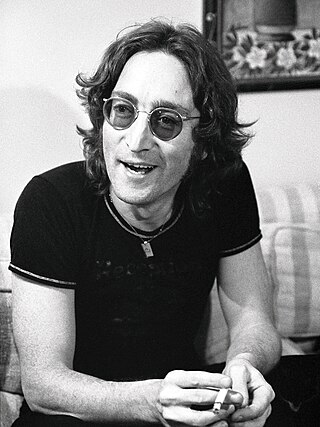
John Winston Ono Lennon was an English singer, songwriter and musician. He gained worldwide fame as the founder, co-lead vocalist and rhythm guitarist of the Beatles. His work included music, writing, drawings and film. His songwriting partnership with Paul McCartney remains the most successful in history as the primary songwriters in the Beatles.

Yoko Ono is a Japanese multimedia artist, singer, songwriter, and peace activist. Her work also encompasses performance art and filmmaking.
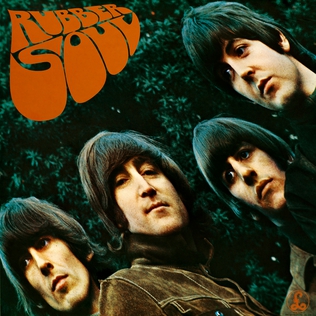
Rubber Soul is the sixth studio album by the English rock band the Beatles. It was released on 3 December 1965 in the United Kingdom on EMI's Parlophone label, accompanied by the non-album double A-side single "Day Tripper" / "We Can Work It Out". The original North American release, issued by Capitol Records, contains ten of the fourteen songs and two tracks withheld from the band's Help! album. Rubber Soul was described as an important artistic achievement by the band, meeting a highly favourable critical response and topping sales charts in Britain and the United States for several weeks.

John Lennon/Plastic Ono Band is the debut solo studio album by English musician John Lennon. Backed by the Plastic Ono Band, it was released by Apple Records on 11 December 1970 in tandem with the similarly titled album by his wife, Yoko Ono. At the time of its issue, John Lennon/Plastic Ono Band received mixed reviews overall, but later came to be widely regarded as Lennon's best solo album.

"Revolution" is a song by the English rock band the Beatles, written by John Lennon and credited to the Lennon–McCartney partnership. Three versions of the song were recorded and released in 1968, all during sessions for the Beatles' self-titled double album, also known as the "White Album": a slow, bluesy arrangement included on the album; an abstract sound collage that originated as the latter part of "Revolution 1" and appears on the same album; and the faster, hard rock version similar to "Revolution 1", released as the B-side of "Hey Jude". Although the single version was issued first, it was recorded several weeks after "Revolution 1", intended for release as a single. A music video for the song was shot using the backing track from the single version, their appearances reflecting the song's atmosphere, along with live-sung lyrics that more closely resemble the album version.
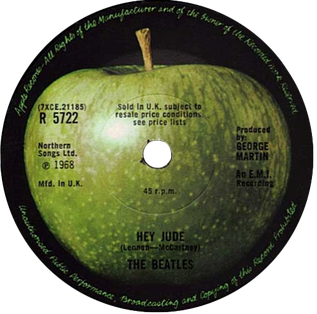
"Hey Jude" is a song by the English rock band the Beatles that was released as a non-album single in August 1968. It was written by Paul McCartney and credited to the Lennon–McCartney partnership. The single was the Beatles' first release on their Apple record label and one of the "First Four" singles by Apple's roster of artists, marking the label's public launch. "Hey Jude" was a number-one hit in many countries around the world and became the year's top-selling single in the UK, the US, Australia and Canada. Its nine-week run at number one on the Billboard Hot 100 tied the all-time record in 1968 for the longest run at the top of the US charts, a record it held for nine years. It has sold approximately eight million copies and is frequently included on music critics' lists of the greatest songs of all time.

251 Menlove Avenue is the childhood home of the Beatles' John Lennon. Located in the Woolton suburb of Liverpool, it was named Mendips after the Mendip Hills. The Grade II listed building is preserved by the National Trust.
"How Do You Sleep?" is a song by English rock musician John Lennon from his 1971 album Imagine.

"Something" is a song by the English rock band the Beatles from their eleventh studio album Abbey Road (1969). It was written by George Harrison, the band's lead guitarist. Together with his second contribution to Abbey Road, "Here Comes the Sun", it is widely viewed by music historians as having marked Harrison's ascendancy as a composer to the level of the Beatles' principal songwriters, John Lennon and Paul McCartney. Two weeks after the album's release, the song was issued on a double A-side single, coupled with "Come Together", making it the first Harrison composition to become a Beatles A-side. The pairing was also the first time in the United Kingdom that the Beatles issued a single containing tracks already available on an album. While the single's commercial performance was lessened by this, it topped the Billboard Hot 100 in the United States as well as charts in Australia, Canada, New Zealand and West Germany, and peaked at number 4 in the UK.
The Plastic Ono Band were a rock band formed by John Lennon and Yoko Ono in 1969 for their collaborative and solo projects based on their 1968 Fluxus conceptual art project of the same name.
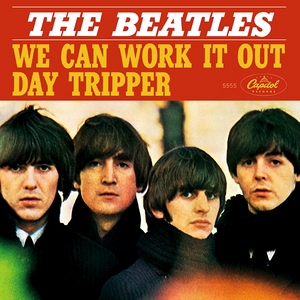
"Day Tripper" is a song by the English rock band the Beatles that was released as a double A-side single with "We Can Work It Out" in December 1965. The song was written primarily by John Lennon with some contributions from Paul McCartney and was credited to the Lennon–McCartney partnership. Both songs were recorded during the sessions for the band's Rubber Soul album. The single topped charts in Britain, Ireland, the Netherlands and Norway. In the United States, "Day Tripper" peaked at number five on the Billboard Hot 100 chart and "We Can Work It Out" held the top position.

"Cold Turkey" is a song written by English singer-songwriter John Lennon, released as a single in 1969 by the Plastic Ono Band on Apple Records, catalogue Apples 1001 in the United Kingdom, Apple 1813 in the United States. It is the second solo single issued by Lennon and it peaked at number 30 on the Billboard Hot 100 and number 14 on the UK Singles Chart. The song's first appearance on an album was Live Peace in Toronto 1969 where the song had been performed live on 13 September 1969 with Lennon reading the lyrics off a clip-board.

"The Ballad of John and Yoko" is a song by the English rock band the Beatles that was released as a non-album single in May 1969. It was written by John Lennon and credited to the Lennon–McCartney partnership, and chronicles the events surrounding the wedding of Lennon and Yoko Ono. The song was the Beatles' 17th UK number-one single and their last for 54 years until "Now and Then" in 2023. In the United States, it was banned by some radio stations due to the lyrics' reference to Christ and crucifixion. The single peaked at number 8 on the US Billboard Hot 100. The song has subsequently appeared on compilation albums such as Hey Jude, 1967–1970, Past Masters, and 1.

Mojo is a popular music magazine published monthly in the United Kingdom, initially by Emap, and since January 2008 by Bauer. Following the success of the magazine Q, publishers Emap were looking for a title that would cater for the burgeoning interest in classic rock music. The magazine was designed to appeal to the 30 to 45-plus age group, or the baby boomer generation. Mojo was first published on 15 October 1993. In keeping with its classic rock aesthetic, the first issue had Bob Dylan and John Lennon as its first cover stars. Noted for its in-depth coverage of both popular and cult acts, it acted as the inspiration for Blender and Uncut. Many noted music critics have written for it, including Charles Shaar Murray, Greil Marcus, Nick Kent, David Fricke, Jon Savage and Mick Wall. The launch editor of Mojo was Paul Du Noyer and his successors have included Mat Snow, Paul Trynka, Pat Gilbert and Phil Alexander. The current editor is John Mulvey.
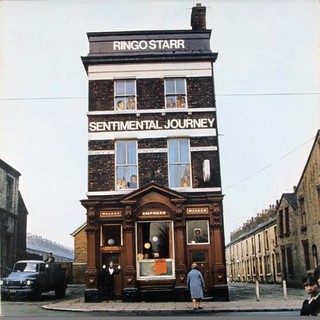
Sentimental Journey is the debut solo album by English rock musician Ringo Starr. It was released by Apple Records in March 1970 as the Beatles were breaking up. The album is a collection of pre-rock 'n' roll standards that Starr recalled from his childhood in Liverpool. As a departure from the experimental quality that had characterised solo LPs by George Harrison and John Lennon since 1968, it was the first studio album by an individual Beatle to embrace a popular music form.
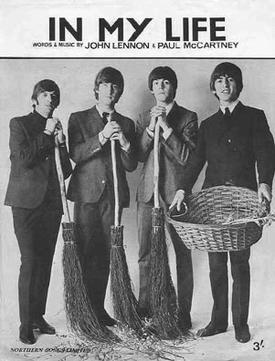
"In My Life" is a song by the English rock band the Beatles, released on their 1965 studio album, Rubber Soul. Credited to the Lennon–McCartney songwriting partnership, the song is one of only a few in which there is dispute over the primary author; John Lennon wrote the lyrics, but he and Paul McCartney later disagreed over who wrote the melody. George Martin contributed the piano solo bridge.

"Wah-Wah" is a song by English rock musician George Harrison from his 1970 triple album All Things Must Pass. Harrison wrote the song following his temporary departure from the Beatles in January 1969, during the troubled Get Back sessions that resulted in their Let It Be album and film. The lyrics reflect his frustration with the atmosphere in the group at that time – namely, Paul McCartney's over-assertiveness and criticism of his guitar playing, John Lennon's lack of engagement with the project and dismissal of Harrison as a songwriter, and Yoko Ono's constant involvement in the band's activities. Music critics and biographers recognise the song as Harrison's statement of personal and artistic freedom from the Beatles. Its creation contrasted sharply with his rewarding collaborations outside the group in the months before the Get Back project, particularly with Bob Dylan and the Band in upstate New York.
Mat Snow is an English music journalist, magazine editor, and author. From 1995 to 1999, he was the editor of Mojo magazine; he subsequently served in the same role on the football magazine FourFourTwo.
References
- ↑ "Paul Du Noyer , Esq". Debrett's . Retrieved 30 October 2011.
- ↑ "Sounds of the city". The Guardian . 30 October 2011. Retrieved 30 October 2011.
- ↑ "From Tin Pan Alley to Tinchy Stryder". NME . Retrieved 30 October 2011.
- ↑ "Paul Du Noyer: Liverpool: Wondrous Place". drownedinsound.com. Archived from the original on 20 October 2014. Retrieved 30 October 2011.
- 1 2 "Paul Du Noyer". us.macmillan.com. Retrieved 30 October 2011.
- ↑ "Paul Du Noyer". beatlesfestival.co.uk. Archived from the original on 25 April 2012. Retrieved 30 October 2011.
{{cite web}}: CS1 maint: bot: original URL status unknown (link) - 1 2 "Journalism: The Beatles > 3. Paul McCartney". pauldunoyer.com. Archived from the original on 27 July 2015. Retrieved 5 May 2021.
- 1 2 Sounes, Howard (2010). Fab: An Intimate Life of Paul McCartney. London: HarperCollins. p. 419. ISBN 978-0-00-723705-0.
- ↑ Garcia, Gilbert (28 January 2003). "The Ballad of Paul and Yoko". Salon . Archived from the original on 7 July 2012. Retrieved 21 February 2020.
- ↑ Doggett, Peter (2011). You Never Give Me Your Money: The Beatles After the Breakup. New York, NY: It Books. pp. 291–92, 325–26. ISBN 978-0-06-177418-8.
- ↑ "Word Podcast 188 - the Bowiecast". The Word. Archived from the original on 17 October 2011. Retrieved 30 October 2011.